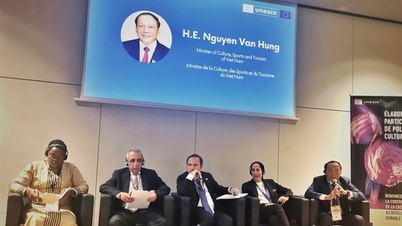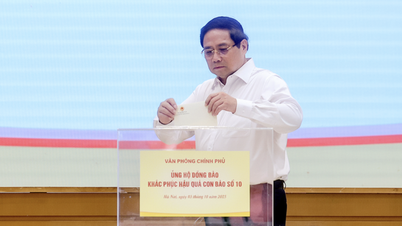Many opinions believe that, in the long term, eliminating the consideration of academic records in university admissions is a solution worth considering to increase transparency, ensure input quality and fairness in admissions. However, there needs to be a suitable roadmap, combining reform of the High School Graduation Exam and strict control of the quality of academic records in high schools so as not to reduce the opportunities of disadvantaged students.

Dr. Dong Manh Cuong, Head of the Faculty of Business and admissions expert at British University Vietnam, said that the decision to keep or abolish university admission based on academic records needs to be viewed in a balanced way from both perspectives.
In fact, the report card reflects the continuous learning process of students throughout three years of high school. For those who have made persistent efforts, the report card is an important proof of their ability and learning attitude. Using the report card in admissions also helps reduce the pressure of exams, creating opportunities for many students not to put all their expectations on a single exam.
However, reality also shows that the academic scores in many schools are different, even "inflation" occurs. This raises concerns about fairness, transparency and difficulty in ensuring the level of input quality between candidates and different educational institutions.
However, according to Dr. Dong Manh Cuong, for now, we should not completely abandon the selection of transcripts, but we should not consider it as the main method. A suitable direction is to maintain transcripts as a supplementary method alongside the high school graduation exam or the competency assessment exam. At that time, the exam score will be the main criterion, and transcripts will be used for additional assessment or applied to some less competitive majors, suitable for the comprehensive capacity of candidates.
This approach ensures transparency and creates opportunities for many different groups of students, especially disadvantaged students who have not had the opportunity to access competency assessment exams or international certification exams.
Mr. Dinh Duc Hien, Principal of FPT Bac Giang Inter-level High School, also believes that we should not approach the direction of eliminating or keeping the consideration of academic records, but instead, we need to come up with solutions to use this admission method to ensure more efficiency and fairness. The immediate solution is that universities can limit the admission rate based on academic records or consider academic records as only one of the entrance requirements.
Sharing more with CAND Newspaper reporters about this issue, Associate Professor Dr. Do Van Dung, former Principal of Ho Chi Minh City University of Technical Education, said that although university admission based on academic records is a popular method, in recent years this method has caused controversy due to issues related to transparency, input quality and fairness in admission.
According to Associate Professor Dr. Do Van Dung, in reality, there is a phenomenon of many high schools raising their transcript scores to increase the rate of students admitted to universities. As a result, transcript scores do not accurately reflect students' abilities, reducing transparency and objectivity when students from schools that "raise scores" have an advantage over schools that strictly grade. In addition, "raising" transcript scores also distorts the quality of input, making it difficult for universities to properly assess candidates' abilities.
Admission data from a number of universities shows that students admitted based on their transcripts often have lower academic ability than students admitted based on their high school graduation exam scores or ability assessment tests because transcript scores are based on many small tests, which are easier to "cope" with than standardized tests.
As a result, students with transcripts have difficulty keeping up with university programs, especially in engineering, medical or science fields that require a solid foundation. Universities have to organize remedial classes, increasing training costs and extending study time. The quality of output decreases, affecting the reputation of the school and the employment opportunities of students.
In addition, the fact that many universities reserve 30-70% of their quotas for considering transcripts also reduces the quotas for considering high school graduation exam scores and competency assessment tests. This has pushed up the benchmark scores for the exam method, causing disadvantages for students who do not consider transcripts, causing unfairness in admissions...
Associate Professor Dr. Do Van Dung said that in the long term, eliminating the consideration of academic records in university admissions is a solution worth considering to increase transparency, ensure input quality and fairness in admissions, but it needs to be implemented according to a roadmap so as not to reduce the opportunities of disadvantaged groups of students.
In the immediate future, the Ministry of Education and Training can tighten the admission quota by setting a maximum of 10-20% for considering transcripts, prioritizing less competitive majors or joint programs, or using transcripts as a secondary criterion, combined with high school graduation exam scores/capacity assessment tests and interviews for comprehensive assessment.
Along with that, it is necessary to closely monitor the grading of transcripts, apply technology such as electronic transcripts to ensure transparency; expand the capacity assessment exam with diverse tests, reduce dependence on transcripts or a single exam.
Dr. Le Viet Khuyen, Vice President of the Association of Vietnamese Universities and Colleges, also emphasized: High school transcript scores currently have different "skews" between schools and localities. Therefore, if viewed from a general perspective, the fact that schools only use high school transcript scores to enroll students into universities is not trustworthy enough for society.
According to Mr. Khuyen, instead of simply using high school transcripts for admission, universities should only consider this as an initial admission condition and must include other combined conditions such as high school graduation exam scores, international language certificates, interviews, essays, thinking assessment tests, and capacity assessments for admission. This method will have higher reliability and also ensure more fairness.
Source: https://cand.com.vn/giao-duc/bo-xet-tuyen-dai-hoc-bang-hoc-ba-can-co-lo-trinh-phu-hop-i782279/





![[Photo] Binh Trieu 1 Bridge has been completed, raised by 1.1m, and will open to traffic at the end of November.](https://vphoto.vietnam.vn/thumb/1200x675/vietnam/resource/IMAGE/2025/10/2/a6549e2a3b5848a1ba76a1ded6141fae)


























































































Comment (0)